Far too many of our neighbors lack access to healthy food…
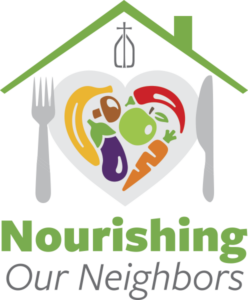
A lack of nutritious meals can have long lasting effects on the physical, mental, and social well-being of all members of a family. People in food-insecure households spend roughly 45% more on medical care in a year than people in food-secure households. Extensive research also shows a strong correlation between food insecurity and chronic health conditions among various age groups: children, working-age adults, and seniors.*
Food insecurity among children causes:
A greater risk for asthma, anemia, and oral health problems.
Below average academic test scores in reading and mathematics.
An increased prevalence of hyper-activity, aggression, and anxiety.
Seniors living in food insecure homes:
Intake 10% less key nutrients such as iron, calcium, and protein.
Have a 70% higher risk of diabetes, congestive heart failure, and heart attack.
Are nearly 3 times as likely to experience depression.
Food insecurity is over twice as likely in these areas.
Low access communities face increased obesity, particularly among children.
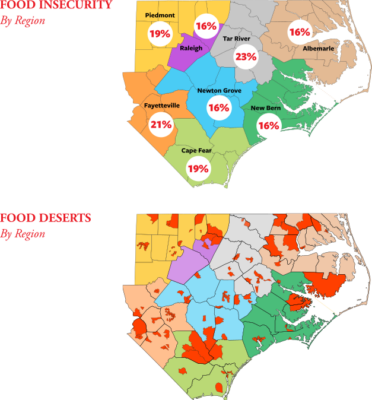
received food
of food distributed
served
impacted
Traditional Food Pantries
Mobile Food Pantries
Volunteers
Volunteer Hours

The Nourishing Our Neighbors Campaign will provide the support needed to serve the community in an innovative and inclusive manner.
Catholic Charities will upgrade services to be more accessible, educational, and sustainable. These improvements will help families change their relationships with food and empower them to maintain healthier diets.
Catholic Charities will alleviate the effects of poverty for families experiencing food insecurity in underserved urban, rural, and remote communities.
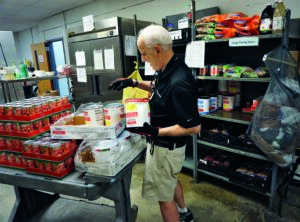
Catholic Charities traditional food pantries have operated for over 45 years. During this time, an effective and efficient delivery model has been refined to distribute pre-packaged groceries to families and provide a high impact with limited resources. During times of elevated demand, Catholic Charities was able to distribute groceries to over 200 families in a 3-hour distribution window, or an average of one family every minute. The efficiency of this model is critical to meeting the increasing demand for food in densely populated communities.
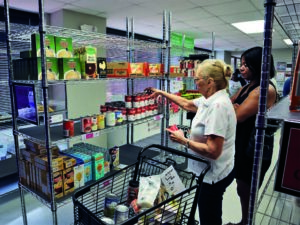
Client Choice Food Pantries create a supermarket experience at a Catholic Charities facility by utilizing a model which empowers families and minimizes food waste. Families can actively select groceries that they prefer, which accommodate health conditions such as diabetes and high blood pressure, and align with limitations they may face in preparing meals. Additionally, trained volunteers accompany clients through the shopping process and provide guidance specific to the family’s needs.
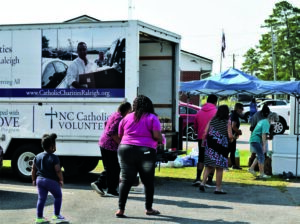
Mobile Food Pantries expand services beyond the physical footprint
of Catholic Charities offices and into underserved communities in an efficient and cost-effective manner. Through this model, Catholic Charities hosts mobile points of distribution for groceries in underserved communities on a recurring schedule. Low-income families who may need to drive 40-minutes round trip to the nearest supermarket can access healthy groceries locally through the mobile food pantry.
Unhealthy diets are a common symptom of living in poverty and can lead to detrimental impacts on a family’s quality of life. Research shows that 50% of all African American and Latino children born in the year 2000 will develop diabetes or heart disease*, groups also over represented as living in poverty.
 Provide a week’s worth of groceries to families through traditional, client choice, and mobile food pantries.
Provide a week’s worth of groceries to families through traditional, client choice, and mobile food pantries.
Distribute a balanced selection of grains, vegetables, fruits, and protein to support a healthy diet.
Develop relationships with local farmers, food rescue resources, local parishes, and wholesale providers of donated and purchased food to create diverse and sustainable sources of healthy groceries.
Catholic Charities will alleviate the effects of poverty by meeting a family’s basic need for
food through the distribution of healthy groceries.
Healthy groceries are easily accessible to low-income and food insecure families through the network of
Catholic Charities food pantries. Families have more time and resources to focus on moving out of poverty and improving their self-sufficiency.
For families facing food insecurity, just having enough food is a challenge. Preparing meals that are fulfilling and healthy is an additional hurdle, especially in communities which are flooded with unhealthy options and where available fresh produce is limited.
 Teach | Share nutrition education through:
Teach | Share nutrition education through:
• One-on-one conversations with families
• Cooking demonstrations and community expos
• Healthy recipes distributed with groceries
Build | Volunteers will construct:
• Potted plant setups for families with limited space
• Raised garden beds for families with a backyard
• Community gardens
Grow | Families will be supported:
• By a gardening expert or peer mentor
• With guidance as they learn new skills
• With encouragement to maintain their gardens
Nutrition focused education and local gardens will transform lives and create hope by empowering families to make healthy food choices and grow their own produce.
Selecting nutritious groceries and preparing healthy meals is part of the daily routine for low-income families. Fresh produce is available to families across the Diocese of Raleigh by stepping out their back door or traveling a short distance to a shared community garden.
Systemic change occurs when families are provided a hand-up, rather than a hand-out. Catholic Charities will invest time, money, and talent in underserved communities to create a retail market to provide a dignified opportunity for food insecure families to shop for healthy groceries. The retail market will generate revenue to support food programming and create
economic growth within the community.
 Operate a retail market offering healthy groceries, ready to at, and ready to heat meals at affordable prices.
Operate a retail market offering healthy groceries, ready to at, and ready to heat meals at affordable prices.
Develop relationships with multiple food vendors to divert food away from the cycle of waste and keep the cost of sourcing food low.
Create employment and volunteer opportunities through the retail market.
Utilize commercial kitchen space to prepare food for the retail market and mobile food pantries, and host educational workshops.
The retail market will shift Catholic Charities from a client focused model to a customer-driven model,
recognizing the dignity of families served and empowering them for the future. The program also grows Catholic Charities beyond alleviating the effects of poverty and begins addressing root causes of poverty by providing employment opportunities and economic development.
The retail market is a staple of the local community where families access healthy groceries at affordable prices. The retail market contributes to the overall goal of addressing food insecurity by generating revenue to support Catholic Charities food pantries.
New equipment such as forklifts, pallet jacks, and commercial scales are needed to maintain efficient operations as food pantry programs grow.
Catholic Charities is increasing the amount of fresh produce, dairy, and meat clients receive. Added refrigeration and freezer space is needed to preserve these groceries.
By 2025, Catholic Charities will distribute an additional one million pounds of food each year. Increased warehouse space will be needed to accommodate this expansion.
New supplies, such as hand tools, pots, soil, and fertilizer, are needed to build and install raised garden beds, potted gardens, and community gardens.
Additional vehicles will be needed to support increased food service operations and deliver food into underserved communities. Box trucks and vans will be purchased to meet local needs.
The commercial kitchen space will be filled with refrigerators, freezers, stoves, ovens, and cooking equipment to prepare food for distribution to the community.
Shoppers will select their items from shelves stocked with healthy groceries and a refrigerated display case with ready to eat and ready to heat meal solutions. The retail market will provide an inviting shopping experience with affordable prices.
Expanded food pantry options and fresh grocery distribution will require increased spending on healthy food for our neighbors in need.

Jim Baker
CO-CHAIR
Jim Baker previously served on the Catholic Charities Board of Directors
for six years, serving as Chair for two years, the Diocese of Raleigh Finance Committee, and the Finance Council at St. Michael The Archangel in Cary. Jim is a husband and father of four and has spent the last 30 years in the business world as an entrepreneur, investor, and advisor. Currently, Jim
is the Board Chair of Durham Nativity School, a partner in Optimal Bio, a North Carolina based wellness practice, and is the owner of 50Cups and Global Village Organic Coffee in Raleigh.

Karen Swoboda
CO-CHAIR
Karen Swoboda previously served on the Catholic Charities Board of Directors for six years, serving as Chair for one year. She is the president of the Swoboda Family Foundation, which focuses on leadership education, sustainability, and building strong communities. Karen and her husband, Chuck, are National Co-Chairs for Marquette University’s comprehensive fundraising campaign and she has served on various committees for Habitat for Humanity of Wake County. Karen holds a civil engineering degree from Marquette University and has lived in the Triangle area for 29 years.
Lisa Perkins
CHIEF EXECUTIVE OFFICER
Daniel Altenau
DIRECTOR OF COMMUNICATIONS
Michael Dawson
DIRECTOR OF FINANCE
Katey Fithian
DIRECTOR OF DEVELOPMENT
Barkley Sample
DIRECTOR OF FOOD AND NUTRITION
Adam Jones
RESTAURANT AND HOSPITALITY CONSULTANT
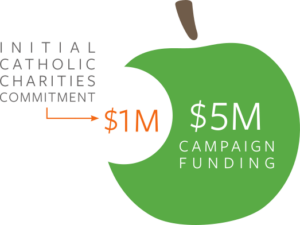
Catholic Charities has committed $1 million to begin expanding food pantry services throughout the Diocese of Raleigh. The Nourishing Our Neighbors Campaign will raise an additional $5 million to accomplish our goals. We are looking for individuals and organizations to build upon our past success and join us in creating new, exciting, and innovative solutions to address food insecurity.
Please consider making a gift to help Catholic Charities reach this goal and positively impact your neighbors in need. Your support is critical to delivering needed nutritional resources to families in underserved urban, rural, and remote communities.
Questions: Contact Katey Fithian, Director of Development Katey.Fithian@ccharitiesdor.org | (984) 900-3119